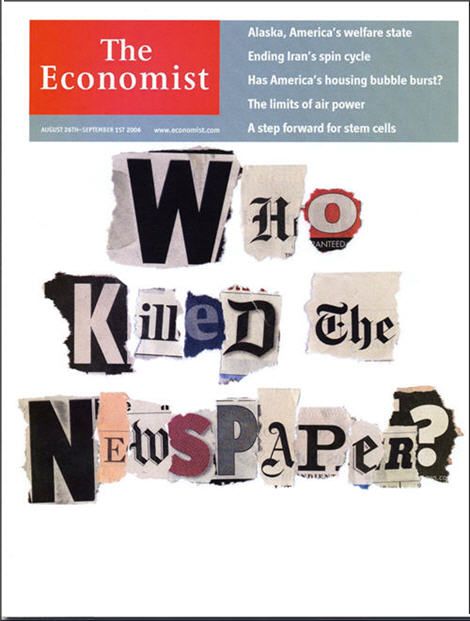I remember when this
August 2004 Economist issue arrived at my family’s home. My brother was
visiting from New York where he was at Columbia’s School of Journalism, and he
and my father told me to remember the cover image because it represented the
future of journalism. For some reason, the ransom note-inspired cover stuck in
my memory and I have realized over and over that it speaks a truth still
relevant today.
What has changed in
journalism and other printed material since 2004?
The development of a new
genre of literature. Regardless of one’s opinion about print vs. digital
material, the reality is that digital media has become a genre all its own
within the literary tradition complete with its own digital archive.
What makes online
literature and journalism its own genre is complex, from the immediacy of
publication and reception to the physical manifestation it takes on desktops,
iPhones, and iPads. One notable characteristic of the genre is the new sense of
time and space. Digital literary material is often shorter and is marked by
straightforward diction and the use of imagery to invoke something in fewer
words. The scale has also shifted within this new genre, with more information
available in a shorter amount of time in a larger level of accessibility than
print material. In this way, digital literary material facilitates
transnational communication and the development of globalized online
communities and discourse (see the Arab Spring).
Other aspects of the
genre include the use of external links,
which function as a type of digital embedded narrative in which there is a
story within a story. An article’s external link amplifies the material in the
original text, creating a cross-disciplinary frame within a frame. It also
facilitates communication between writers and publications, creating an online
community and forum.
Finally, the digital
literary genre’s most notable quality: the digital soapbox. Online literature
is often unmediated and is an available location for multiple voices as once.
Our confession culture means that people often find self-authenticity through
voice, and the internet is an immediately accessible publication space. Because
of this, secret hobbies and quirks are transformed into public art forms and
online forums, cultivating subcultures that transcend geographic and social
boundaries. The digital soapbox is perhaps the most defining aspect of the
digital literary genre that most characterizes the archive and distinguishes it
from print material, providing a product unique to online materials.

No comments:
Post a Comment